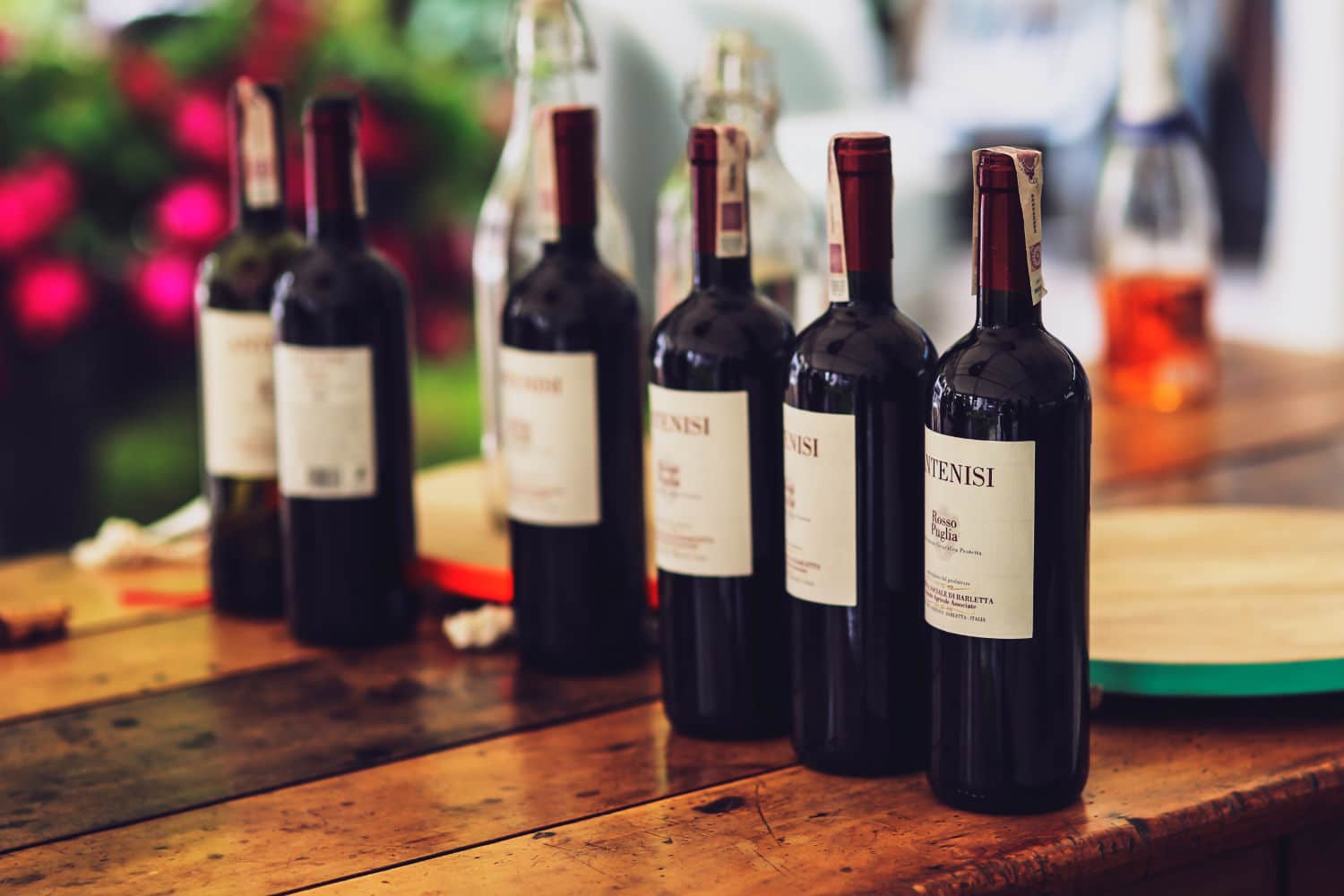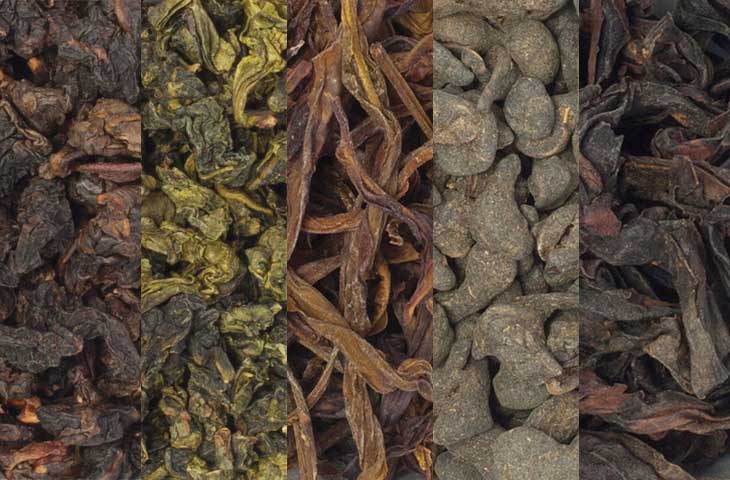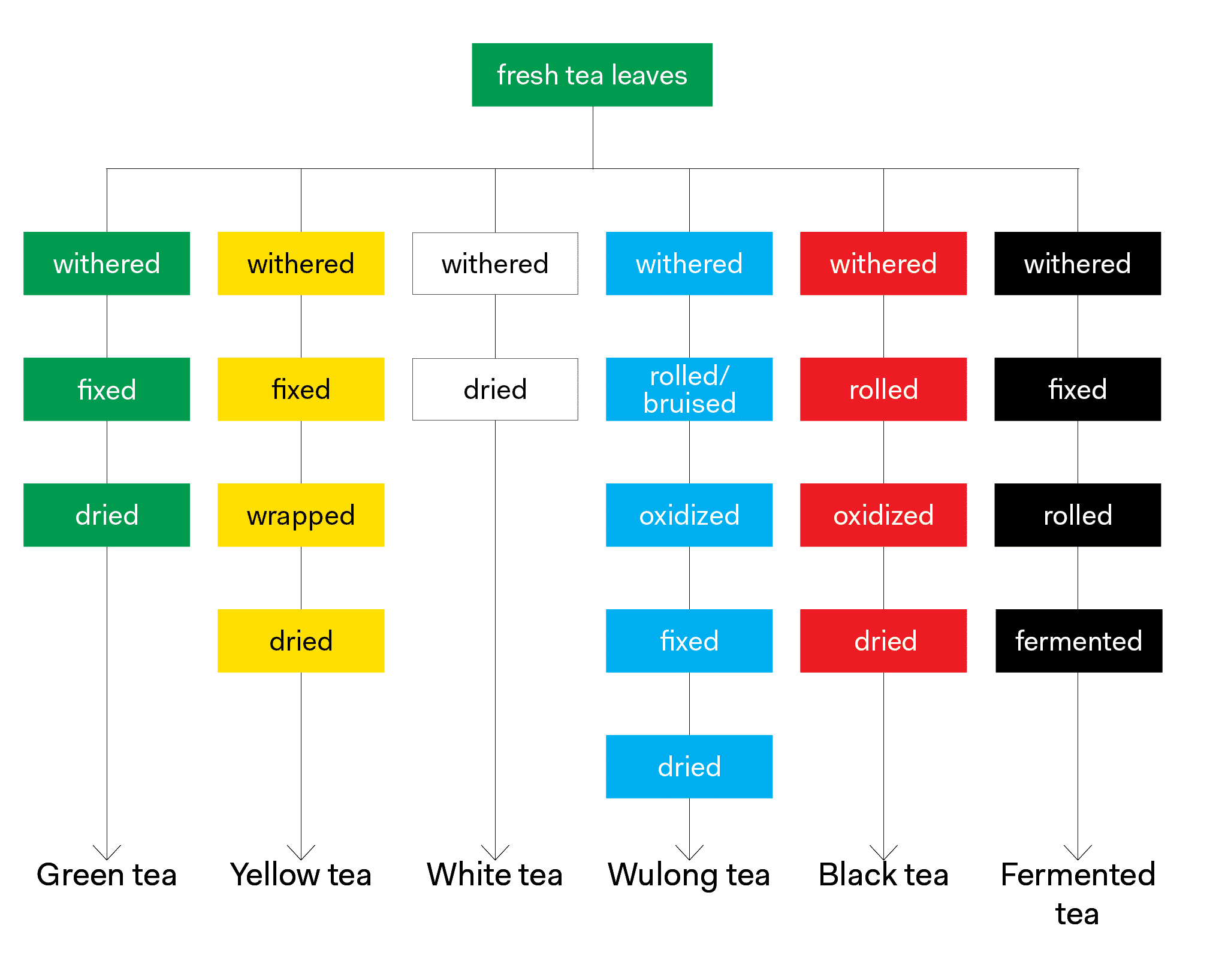Aaron Fisher was born and raised in Ohio in the United States. He studied Asian Philosophy and Anthropology in college. During his freshman year, he got into tea and meditation. After college, Aaron moved to Asia where he has resided for 20 years now. He has written several books on tea. He founded Global Tea Hut, a successful print magazine that ships with a new sample of tea each month that he and his team has sourced and the Tea Sage Hut, a free center in Taiwan that has been providing free tea education and meditation lessons for the past 6 years. During his time in Asia, Aaron Fisher has become known as Wu De. I recently asked him about his transformation and about his teachings surrounding tea and meditation and our conversation is what follows.
What did you do before moving to Asia? What was your life like in the states? Where did you live?
I was born and raised in Ohio. I studied Asian philosophy and anthropology in college. My freshman year I got into meditation and tea. I had practiced martial arts as a boy, so much of this was a returning. My sophomore year I decided that after college I would move to India to further my meditation, studies and eventually become a monk. I didn’t even attend my graduation ceremony. The party my parents threw was also a farewell. I left two weeks after college finished.
How did your life in the states prepare you for travel and an eventual permanent move to Asia?
There are stories in my family that seem legendary now. I wrote to Santa when I was two, and again three, four and five years old asking for a “Chinese sister.” My parents were baffled. I then got into martial arts, watched lots of kungfu double features, the TV show “Kung Fu,” etc. Interestingly, I also was very crazy about Taiwan since all my toys were “Made in Taiwan,” as was everything in those days. Then, as I mentioned, I studied these things in college. I was also heavily involved in a meditation tradition called “Vipassana,” studying under S. N. Goenka. In those days, the American Centers didn’t offer long courses, so one had to travel to India to deepen one’s practice, so I was motivated to turn East.
Tell me about your involvement in Wushing Publication’s “Art of Tea” Magazine
The “Art of Tea” is out of print. I still help out at Wushing, though. The owners, suname Liang (father and son), are dear friends of mine, as is the senior editor Ms. Rou. The Art of Tea began out of a long-term goal I had to share tea wisdom in English. When I was in school and started drinking tea there was only the beginning of an Internet and no tea on it. And there really weren’t any books either, just Blofeld and Pratt (both great and must reads). I would have the engineering students at school translate tea books I got from China for fifty dollars and they would come back as you would expect—Chinglish much like what Google Translate provides. I would pour over that stuff and sometimes after twenty minutes studying a single page, realize that the whole chapter was communist propaganda. I have been writing since a young age. At that time I vowed to do something about this, but what? Years later, the idea came back as I was having tea with Mr. Liang. I kept bugging him to start an English magazine but they had no English-speaking staff, and no market for it, so he kept saying no. Eventually, they agreed and the magazine was published.
You are now more well-known as Wu De rather than Aaron Fisher. Where did the name Wu De come from?
I am an ordained Zen priest. In Japan, they still say “monk,” but since we can marry and etc., I feel that word is no longer relevant. My ordination name was “Wu Wei Hai.” But I never resonated with that enough to actually call myself that. On a trip, one of my tea teachers made an untranslatable joke at the expense of that name, which resulted in all the Chinese people calling me “Wu De” for the rest of the trip. It sunk in deep and I took it on. As priests/monks, we are supposed to set down our family name and take on a dharma name, but it is not an enforced convention in Japan (like many others). But it felt right. I believe in changing names. First of all, I never resonated with “Aaron.” I am not named after Moses’ brother or my father or another family member. Like many American parents, my parents chose my name out of a book of names, without even knowing its meaning. (And it seems like they were lazy and chose the first name). When a hunk of steel changes form enough we call it a “car,” not a “mobile hunk of steel.” When things change form, they change nouns, no? I, too, have changed form. Drastically. Many, many cultures (most Native Americans, for example) would change names in life, and often based on their deeds. What they did became who they are. I haven’t yet earned my new name, but I strive for it. It reminds me to ask who I am. “Wu De” means “of nothing.” It is a name that encourages me to strive towards my two goals in life: to be more present and awake and to be more loving and compassionate. Though I fall short of these in every way, it helps to have people call out a name that inspires me to strive on.
Do you consider yourself a Tea Master?
Sometimes writers or event-promoters will introduce me as a “master,” but my American/European students never use this word. And I am glad. It is an ugly word in America, referring more often to owners of dogs or slaves. It is often pejorative. “Teacher” is much better, no? In the beginning, after my teacher gave me transmission, I was unwilling to teach. My teacher scolded me and set me straight, though. Amongst many lessons, he told me that I needn’t feel ready to teach, just be okay with not being ready. Amazingly, after I finally did agree to teach, five students showed up within a week!
That was years ago, but I still often feel unwilling or not prepared to teach others. I am as fragile and vulnerable as you all are, after all. I think that what held me back in the beginning is what remains a barrier today: I feel more like a student. Though you may watch me brew tea and see some skill, I am aware of all the mistakes I make. If you go to a concert and then leave thinking that the guitarist just shredded it all night, he probably knows that he made tons of mistakes—in the third song, especially. The mistakes are most likely subtler than the audience is aware of, since his decades of practice means he is sensitive to a greater degree of magnification than what most people can see even. It is like that with tea and with my spiritual practice as well. Sometimes people at events approach me with an air of reverence and I don’t really know what to do with that. I want to say, “But I am from Ohio, dude!” In other words, I live in this “house” of a self, and I am constantly surveying its contents through daily meditation, so I know better than anyone just how many impurities there are in here. And looking out the streaked and dirty window of this house full of dust at someone who is complimenting it as “such a clean and beautiful home” seems absurd! Sainthood is still just an altar to pray at, reminding myself of a potential I may strive towards. My Zen master always used to say (in a strong Japanese accent): “You want golden Buddha? Buy one!” In Zen, we say that there are no such thing as enlightened beings, only enlightened actions…
I’ve come to celebrate that maybe I am decent at teaching because I am a good student. I am always learning. And I spent many, many years trying my best to humble myself before those wiser than me. Of course, my ego gets in the way sometimes. But I can learn and I can grow. No matter what anyone thinks of me, including myself when being reflective, I can always grow and change. I can be better by surrendering to another way. My potential for transformation is unlimited. That is my ownmost truth. I believe that the light others see in me is just that: I love kindness. I love the light. I am not yet of the light. I am as much shadow as you, or even the worst of them. There is much darkness in me. But I am completely and head-over-heels in love with the light. And I think that others are inspired by someone who is devoted. You might mistake that for the quality itself, but it is just that: an orientation. I have no claims over any achievement, spiritual or worldly! But I can say that I love kindness.
I have always been a good student. I think good teachers have something to teach because they learned a lot. And that means being a good student. That shouldn’t ever end. In the least, I am always learning how to be a better teacher and I learn that from my students. In a way, they are my teachers too. In our tradition we say that behind every master is a good tea servant (cha tong). This means that without an assistant helping with water, etc. the master couldn’t serve tea. But it also means that the master was herself once a servant. I have made a real effort to perform every act of service in the Center, from cleaning the toilet to making the magazine. And I was cha tong to my teacher for years. Tea and Zen are both best learned as apprenticeships, I think. The best tea farmers learned as apprentices (most often to their fathers). The same is true for tea preparation and Zen as well.
You teach Cha Dao, what does it mean to you?
Cha Dao means the Way of Tea. Like many things, the term has become watered down in modern times to mean brewing methods. But it really is self-cultivation through tea—living a life of tea. There are two verbs for doing a thing with commitment in one’s life/career: you make cabinets or you are a cabinet-maker. They aren’t the same thing. You can make cabinets for all kinds of reasons—for money as an hourly job, etc. But if you apprentice with someone who is a cabinet-maker, you will find, most definitely, that included in their art is a) an approach to how to live a human life; and b) an approach to the world in which that life is lived. When you put yourself in a practice completely, you become it. Art was not a hobby for Van Gogh or Michaelangelo. Music was not a pastime for Beethoven or Bach. It was everything. It was a way of life. Above my bed, I have calligraphy that reads: “In every breath, in every step, from the moment I wake til the moment I sleep, I am preparing tea.”
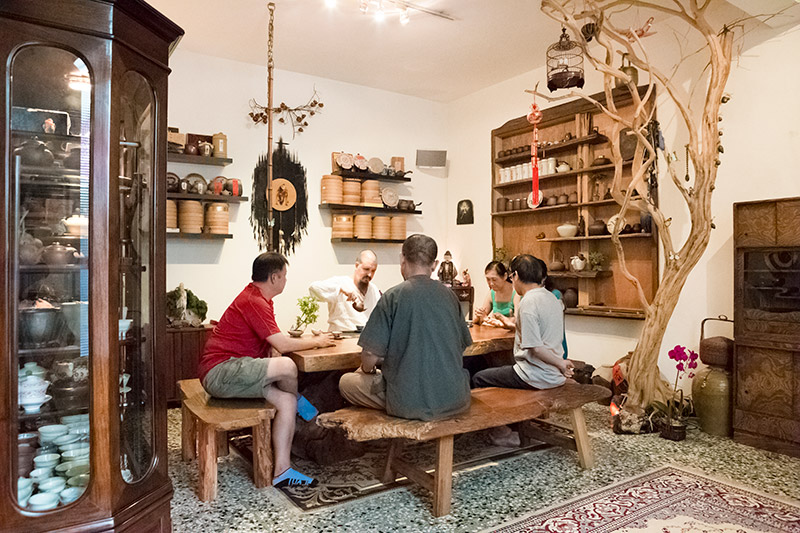
What does tea mean to you outside of Cha Dao?
I don’t think tea is a Dao or it is a beverage. I think “and” is a healthier word here. Tea is a lot of things: it is an act of kindness, it is friendship; it is hospitality. Tea is a means for connecting to Nature. It is medicine. Read the “Fivefold Essence of Tea” pamphlet. It captures this well. We teach tea on all levels at our Center and in our magazine. Global Tea Hut is the best tea magazine on Earth because it is advertisement and shill free, it comes with tea and it covers tea holistically. Without any financial agenda, as a non-profit, we teach about tea history and lore, production and processing, about tea teachers and their stories and about spirit as well. Just because we include spirit doesn’t mean it comes at the expense of earth. Both are truth.
Some in the tea world call your following and practice a “tea cult,” can you speak to this or help dispel this notion?
My business card says, “Student of the Leaf.” People travel to our Center to learn about tea, not about Wu De, which is why I am slightly reluctant to answer all these questions about me! It furthers such dialogue. Gossip is demeaning. There is enough separation in the world. Tea is about kindness and friendship. It is shared from the heart the world over. With so much strife in the world, let tea bring us together. Read the pamphlet “What is a Tea Tradition.” Basically, we are a group of people who share a common approach to tea, practice the same brewing methods and support each other as a community of friends and family. There is no “us” and “them.” There is no “in” and “out.” Just a tradition of brewing methods and wisdom that we share freely with anyone. We do preserve the purity of our tradition’s preparation methods and teachings, but only to preserve their efficacy, not to establish egoic boundaries between individuals or groups of people. We do honor some traditional ceremonies, like initiation, but only to honor what was handed down to us. Participation is open, and progress is measured by service, as we are a service-oriented organization. There are no esoteric teachings. Like any honest company, promotion just means greater responsibility. The reward for true and honest hard work is not vacation, but more work. If you love what you do, and are what you do, then this is an honor.
I always tell visitors that what we do may seem unique, but it is only so in space, not in time. The commoditization, recreationalization and profanation of tea is very modern. In the many thousands of years that tea has been consumed by humans, a sacred approach to it as plant medicine represents the great, great majority of tea people. We are the majority in time, though maybe not nowadays. That is not to say that I feel it is wrong to approach tea in the way many do today. No tea police will knock on your door and give you a ticket for drinking tea out of a mug while watching TV. The punishment for having a superficial relationship to anything is just that: superficiality. It may be a crude analogy, but it works: George treats women like sex objects. As long as the women are consensual partners, I see nothing wrong with this. But as such, George is missing out on a lot in life: love, deep intimacy, marriage, connection, etc. I think that if tea is just a beverage to you that is fine. There is nothing wrong with that. Quite the opposite: if it is grown sustainably, it is a very healthy beverage. Much better than soda, etc. But the fact of the matter is that you will, indeed, be missing out on a lot of deeper aspects of tea, from art to history, lore to spirit, just as George will never really get to know the women he sleeps with as individual people…
Set aside whether or not the feeling of “sacred” corresponds to anything outside of us, or ideas of what that thing is. The fact is every human has experienced the feeling of “sacred.” So it is real, at least as a subject part of our psychological make-up. And I think that even the most cursory survey of human culture over the last fifty thousand years demonstrates our deep-seated psycho-social need for that feeling. We need it like water or food. Without it we can’t be healthy. And I don’t know that because of that survey, though I have studied, I know it personally, experientially. I have lived a life without daily connection to sacred and lived one with it. I know both intimately. And I am much happier, healthier and much closer to the things I deem important. As it says in the pamphlet, we approach tea spiritually because we are spiritually-minded people. We approach life in that way. I understand the difficulty with the word “spiritual.” I am from Ohio and trained in Zen. I am down to earth. Throw that word out if you don’t like it. The Zen answer would be to say that absolute truth, the ground of being, is neither spiritual nor worldly. But ignoring one or the other won’t support a healthy, balanced life…
The fact is, we all (including you and I) forget the things that are most important to us. We forget all the time. And I am not talking about the things I think are important to you, or Zen says should be important to you, etc. I am talking about the things you feel, deep down are most important to you. What is your highest self? Is your wife most important to you? Then why do you forget that so often? If she was gone tomorrow (she may be) would you walk by her so casually today? Would you ignore her in favor of the TV? Why do you forget how important she is to you? (This is rhetorical questioning, of course. But you did mention that you were married in your intro J) Self-cultivation is self-remembrance. It is living towards your potential, striving to become the person you should be. And tea can help. It has helped people in their quest for self-realization for millennia, and in far too numerous ways than can be expressed here.
We meditate and drink tea, learn about tea, learn about meditation, drink tea, talk about tea, and talk about meditation.
A “cult” is just a name for something people don’t relate to or don’t understand. In sociology/anthropology, it literally refers to a group with socially deviant beliefs. On the one hand, in an insane world you have to be insane to be sane. I would hope my beliefs are deviant from the mainstream, which is very ill. I think ten minutes of CNN will prove that. However, some of the famous groups called “cults” definitely have had deviant beliefs/practices that were unhealthy for the members and the communities/society around them, usually violent, sexual or religiously fanatic. If people are looking for gossip of that ilk, they will be sorely disappointed at our Center: There is no sex, nor a patriarchy surrounding Wu De-worship, very little religion (some Zen chanting and we do have Buddhist altars, but guests are not required to participate and Buddhists are very, very rarely fanatic anyway), no required belief system (we have guests/members from many different walks of life/religious backgrounds), no strange financial stuff, guns/weapons or end of the world speeches. We meditate and drink tea, learn about tea, learn about meditation, drink tea, talk about tea, talk about meditation… Did I mention meditation? A typical day at the Center: wake up, silent meditation, silent breakfast, silent tea, tea class (we have spiritual Cha Dao classes, linear classes on how tea is made, how to distinguish quality, etc. and also classes on brewing methods), lunch, service period (gardening, cleaning, etc.), guests practice brewing (practice what they have learned), evening meditation, sleep. As I said, meditation and tea…
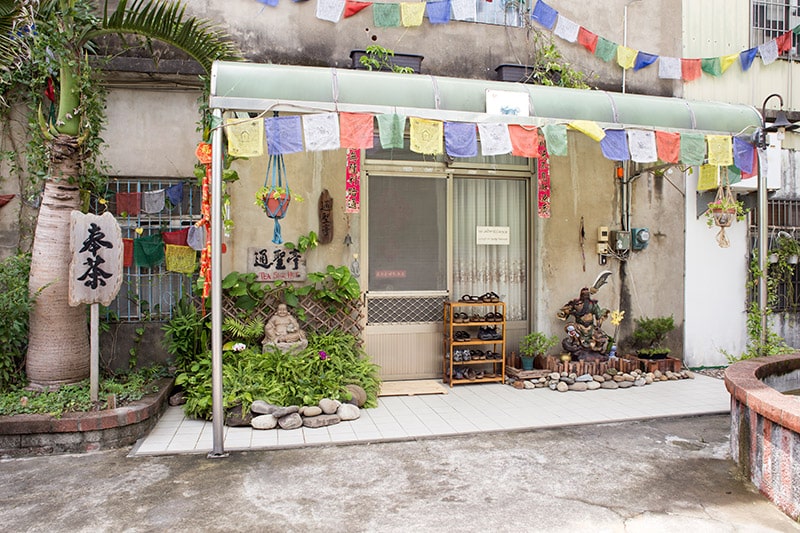
Has Global Tea Hut been growing?
We have grown tremendously. Since the beginning, we have vowed to invest some of the contributions into improving the Global Tea Hut experience itself, not just supporting our free Center. We have a new app coming out soon that will connect members in new ways, we are committed to finding new organic teas, doing more journalism and have also started translating classic tea texts. (So far, we have translated the Cha Jing and Song Dynasty Treatise on Tea.) We are also going through the seven genres of tea. Every September we do an extended issue. In 2014, we published one on puer, for example. Aside from that sociological thesis it is the largest English source of puer info to date. More recently we have done issues on red and green tea as well. As we grow, we are gathering new Chinese reporters, translating more, and doing more journalism to find good stories on tea processing, lore and history. Of course, one of our main goals is to promote environmental harmony. As we grow, we use our buying power as well as our voice to promote sustainable tea production. Without advertising and as a non-profit, we are uniquely situated to express the truth about environmental degradation, as well as the real solutions. As we expand, we hope to serve the tea world more. As you know, all our past issues eventually go onto our site for free. There is no exclusivity in Global Tea Hut. It is a free offering.
What is the essence of your teachings that a visitor to the tea sage hut is most likely to pick up?
No matter what your orientation to tea is, we all love this leaf. You may love the chemistry; she loves the history; him over there, he loves the flavors, while another brother loves the meditative aspects of tea. But we all have this love in common. My first teaching would be this question: How do you love a leaf without loving the forest? How do you love tea without loving Nature? All the past tea traditions are watching us, and all the future tea lovers as well. They are wondering if we will let this all end. When your child is sick, you don’t discuss what haircut style they should have or what kind of art class to enroll them in next year. When your child is sick, there is only one discussion in the house: medicine and healing. Nature is sick. Mother Earth is sick. And we who love tea, who love the leaf, which means loving the forest, must make this discussion our first priority! If ever there was a time when humankind could afford luxuries produced at the expense of Nature, now is definitely not that time.
Tea connects us to Nature. There is an old Chinese saying that, “Tea brings Nature to society.” Tea is different every season, so you are drinking the weather. It is the mountain and forest. And the water in your cup or bowl was literally, scientifically in a cloud less than two weeks ago! Through tea, we reconnect to a feeling of being a part of the Earth from which we arose. In Yunnan, birthplace of tea, most tribes believe they are descended from Tea; and one that I know of, the De Ang, believe that all life on Earth is descended from Tea. Before dismissing these old beliefs, recognize that there is great truth in them: The plant kingdom is our source. It is our source in a big way, as all life on Earth evolved out of plants. And it is also our source in a small way, as every movement of our bodies is all plant energy. They photosynthesize sun, moon and starlight into energy we use. The breath you just took was made by plants, as is all your food (vegetarian or no, it is ultimately all plant energy). We are, in a manner of speaking, the plants’ decision to walk around!
Secondly, tea connects us to ourselves. People think that Wu De is wise and has some answer for how they should live. But I don’t. I have never Tony-ed in my life. I have no experience being you. The best I can do is give you some tools to look within, where your answers lie. Nowadays people don’t even rest when they sleep. They toss and turn and talk and sing.
To be healthy and happy, we must stop moving so fast. And towards what are we running? Only death… We are distracted from our distractions by another distraction. We need inward-facing time. To be healthy, one must have a relationship with oneself. To be wise, one must know one’s self. Every saint, sage and seer that has ever taught has said this: know thyself. Tea can help provide the space and practice to connect with our self in quiet.
Finally, tea offers connection with others. Even if one has never thought of tea as connection with Nature or self, the reason three billion people will drink tea with you today is because it is friendship, hospitality and connection. It is a space to put down gender, class and other separation and find peace together. We have so many separations and are constantly moving apart from one another. If we are to heal this Earth, we are going to have to come together. I don’t believe that there is any difference between people that is lasting and cannot be overcome. I have seen miracles happen in this life facilitated by compassionate heart space. Tea can indeed provide this. We have to find ways and means of connecting that don’t upset, exclude or isolate others—things we can all agree upon. Tea is an important part of us coming together. It is a medicine for this. If you put a Christian, Hindu and Buddhist in a room and they discuss their worldviews, they will argue. But if they go into that same room and drink tea, they come out brothers. I’ve seen it. The Chinese say, “Through tea make friends.”
At our Center we don’t learn how to make tea, we learn how to serve tea.
Ultimately, we have five brewing methods in our tradition. At our Center we don’t learn how to make tea, we learn how to serve tea. Our Center is free, and we actually do go out and serve roadside tea to passersby quite regularly, so it is as if we are serving food. We cook these five dishes and offer them for free. If you only want one tomato from one of the dishes, that is fine. Please have it. If you want a plateful of one dish, go ahead. Maybe you want some of all five. That is fine too. Others see us and they want to learn how we cook these five dishes so they can go serve them in their communities. We then invite them back into the kitchen to learn how. Like this, you can take whatever you like from us, as if it were a buffet. Our magazine also is holistic. I recommend reading and learning the linear lessons, the brewing lessons and the spiritual lessons (just as I would recommend getting to know your wife physically, mentally and spiritually as you spend this life together). But if your interest is only in the production articles or history articles, or you only read the spiritual ones, so be it. It is a magazine; it is not necessarily meant to be read cover to cover. And when guests come to our Center we recognize that not every aspect of our life here will be for everyone. But hopefully some of what we do will improve your ability to serve tea and be happy and fulfilled in your life. Why not try? It is free, after all.

